It is 1937 for the US Federal Reserve
Economics / Economic Depression Apr 16, 2008 - 05:21 PM GMTBy: Mick_Phoenix
 This Letter is a follow on from my article The Future Actions of The Federal Reserve and US Govt are known in which, using the work of GB Eggertsson, we showed that the Fed/US Govt is following a plan to stimulate the economy and avoid a deflationary episode. Essentially the plan is to avoid the mistakes of the Depression and those of Japan in the 90's by using increased Government debt, monetized by the Fed, targeted directly at consumers. By employing a credible threat of an inflationary stance the Fed/US Govt hope to raise inflation expectations and therefore raise the price of assets.
This Letter is a follow on from my article The Future Actions of The Federal Reserve and US Govt are known in which, using the work of GB Eggertsson, we showed that the Fed/US Govt is following a plan to stimulate the economy and avoid a deflationary episode. Essentially the plan is to avoid the mistakes of the Depression and those of Japan in the 90's by using increased Government debt, monetized by the Fed, targeted directly at consumers. By employing a credible threat of an inflationary stance the Fed/US Govt hope to raise inflation expectations and therefore raise the price of assets.
Whilst the groundwork for such actions are already in place as discussed previously, I now wish to concentrate on the effects such actions will have in the future.
Again, I have to write this article without recourse to my own thoughts to keep an objective viewpoint. I will be using GB Eggertsson again as a reference point. Although it would appear to narrow the perspective the fact that his Theory is in play and he is a member of the New York Fed staff would lend weight to his other work in this regard. In December 2005 Eggertsson published a paper entitled " Great Expectations and the End of the Depression" in which he laid out how the policies of President FD Roosevelt allowed the economy to depart from a deflationary environment.
What I want to show is that Eggertsson has based his theory on the successful polices and methods employed by FDR and what effect those policies had on the economy. Within the paper Eggertsson lays out arguments that support the FDR policies as the only credible approach to economic stimulus during a period of deflation. I believe that those policies are now being used to circumvent the current threat of a deflationary period caused by the credit crash.
Before we begin, I would like to show you a quote from the time as FDR enacted his policy change, referred to as a "regime change" (Sargent 1983 and Temin & Wigmore 1990):
"It is hard to overstate how radical the regime change was. "This is the end of Western civilization," declared Lewis Douglas, Director of the Budget, for example. (2) During FDR's fi rst year in o ffi ce several senior government o ffi cials resigned in protest. (3)"
(2) Cited in Davis (1986), p. 107. ( 3) These included Lewis Douglas. The acting Secretary of the Treasury, Dean Acheson, was forced to resign due to his oppisition to unbalanced budgets and the abolishment of the gold standard.
Clearly it was not the end of western civilisation at that time. What we do see is the turmoil that was created by adoption of the new regime. Such events could be compared to the arguments put forward by the recently retired US Comptroller General David M Walker.
History
Without going too deep into history we need to compare the performance of the overall economy during the FDR presidency with the previous 4 year period. Within the following quote from Eggertsson is an interesting observation about the growth of the monetary base:
"The e ff ect of the FDR regime shift is clearly evident in the data. When FDR was inaugurated in March 1933 excessive de fl ation turned into modest in fl ation. There was little change in the trend growth of the monetary base around this turning point. Money growth did not start on a sustained upward trend until several months after prices started to rise. Similarly, the fi scal expansion happened with a substantial lag.
This evidence suggests that the recovery was driven almost exclusively by expectations about future policy. The comparison between FDR's fi rst term in o ffi ce (1933-37) and President Herbert Hoover's last (1929-33) is striking. Hoover's last term resulted in 26 percent de fl ation, while FDR's fi rst registered 13 percent in fl ation. Similarly, output declined by 30 percent from 1929-1933. This was the worst depression in US history. In contrast, 1933-1937 registered the strongest output growth (39 percent) of any four year period in the US history outside of war."
As can be seen in the following table (Eggertsson) 1933 marked the end of the contraction in GDP in dollar terms and the beginning of a large scale expansion of public debt. Noticeable is the acceleration in the growth of the monetary base that begins in 1934, lagging the increase in public debt:
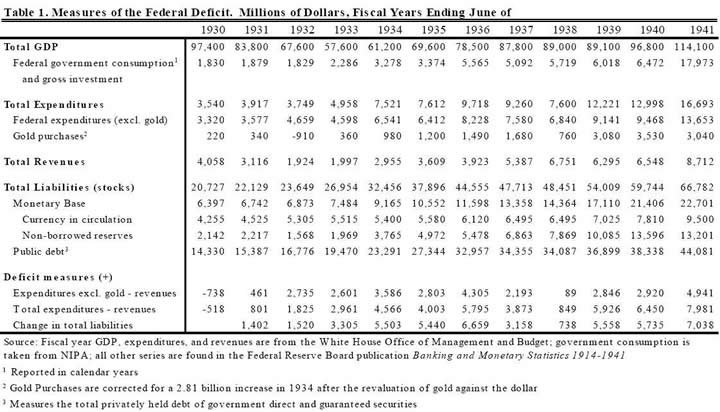
This would support the argument that the increase in debt raised inflation expectations, leading to an increase in monetary demand.
Form this we can infer, without reference to historical writings, that FDR was seen as credible in his regime change. it was this credible approach that allowed inflation expectations to be seen as correct and for monetary requirements to change accordingly.
The Effects
As FDR took office, there was a noticeable turnaround in expectations. Firstly, lets see what the baseline was, according to Eggertsson:
" The reason for the collapse is that the central bank cannot lower interest rates enough to accommodate de fl ationary shocks, due to the zero bound on interest rates and is unable to change expectations about future policy. This creates a strong de fl ation bias. The de fl ation bias helps explain the severity of the Great Depression, because real interest rates were excessively high in 1929-33 due to double digit de fl ation. This choked spending, especially investment. "Money was king" during this period. Nobody was interested in investing when the returns from stu ffi ng money under the mattress were 10-15 percent in real terms. People gained more, in other words, from holding money than spending it."
Or as I said, why spend today when it will be cheaper tomorrow? It is clear that to make the Eggertsson Theory work, the baseline conditions of the economy should be depressed before allowing the already prepared stimulus to be released. Compare the conditions in 1933 to those today:
The short-term nominal interest rate was close to zero during the Great Depression. The yield on three month Treasuries, for example, was only 0.05 percent in January 1933. Further interest rate reductions were clearly not feasible. Open market operations, in themselves, had no e ff ect, since money and government bonds were perfect substitutes. This explains why several observers at the time were skeptical of the e ff ectiveness of monetary policy and believed that open market operations were just like “pushing on a string”.
Despite this, however, monetary policy was far from powerless. While increasing the money supply at zero interest rate has no e ff ect, expectations about higher future money supply (once de fl ationary pressures have subsided and interest rates are positive again) have large e ff ects because they change people's expectations about the future price level, thus reducing real interest rates. What was needed to end the Depression was a regime shift that changed expectations about future policy in a credible way. This is precisely what FDR achieved.
With current 3 month yields at at 1.13% and inflation measures well above, it can be seen why the Fed/US Govt fear a deflationary scenario. The requirement for a credible policy that will result in rising inflation expectations is absolute, to ensure that neither the consumer or business is discouraged from spending or investing. (This has far-reaching consequences, for instance it would not be in the Fed interest to suppress the price of gold)
With this in mind, let us look at some of the effects that FDR policy regime change had post 1933:
Price Levels
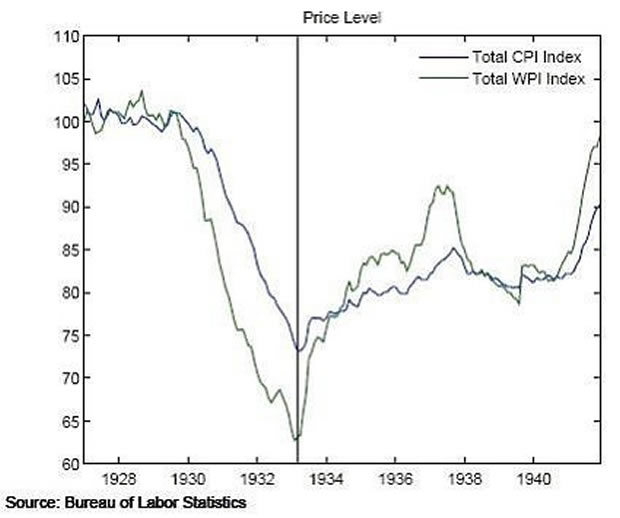
Investment
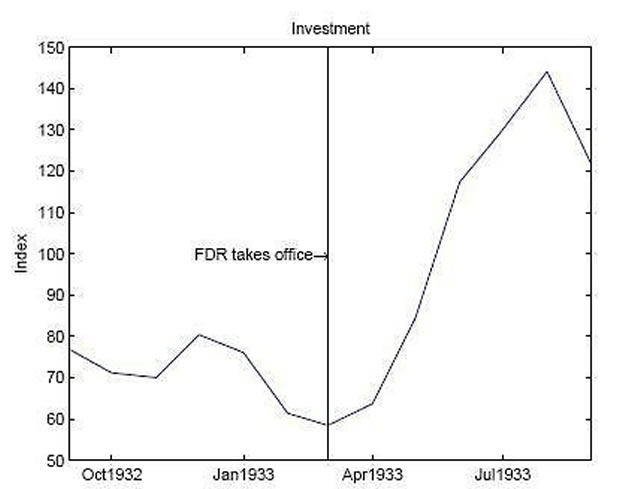
Commodity Prices
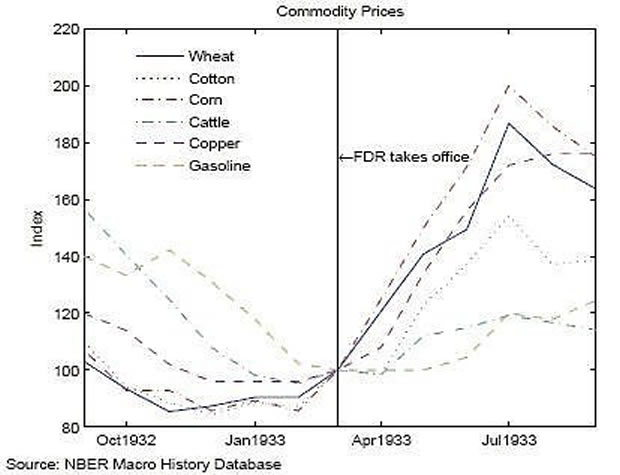
Stocks
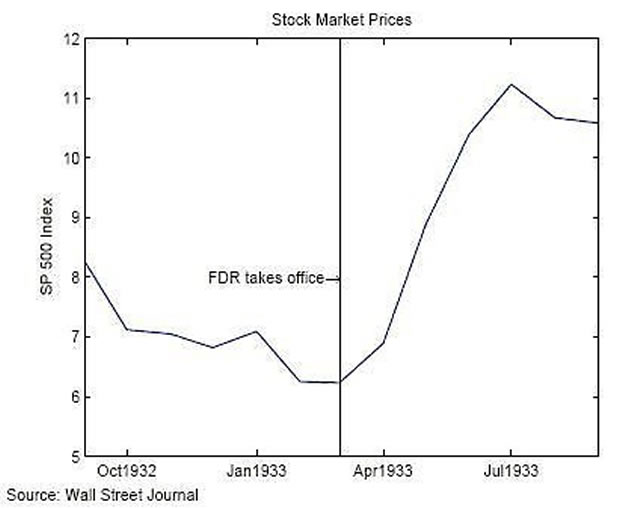
Again, it is clear to see that the expectations of rising inflation based on a credible policy had an almost instant effect on assets and prices before fiscal and monetary policy had time to make their actual changes felt.
Comparisons to Today
To read the rest of this Occasional Letter please visit www.caletters.com
By Mick Phoenix
To contact Michael or discuss the letters topic E Mail mickp@livecharts.co.uk .
Copyright © 2008 by Mick Phoenix - All rights reserved.
Disclaimer: The above is a matter of opinion and is not intended as investment advice. Information and analysis above are derived from sources and utilizing methods believed reliable, but we cannot accept responsibility for any trading losses you may incur as a result of this analysis. Do your own due diligence.
Mick Phoenix Archive |
© 2005-2022 http://www.MarketOracle.co.uk - The Market Oracle is a FREE Daily Financial Markets Analysis & Forecasting online publication.



